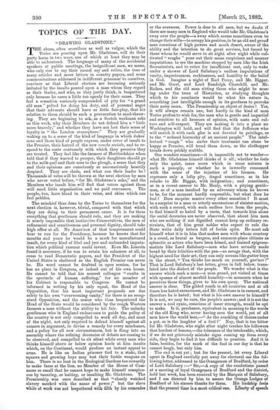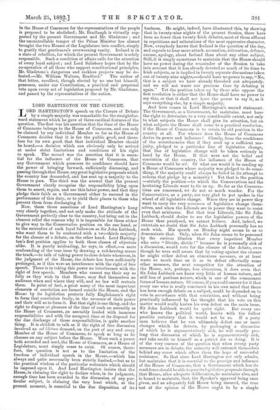TOPICS OF THE DAY.
"DRAWING GLADSTONE."
THE abuse, often scurrilous as well as vulgar, which the Tories are pouring upon Mr. Gladstone, will do their party harm in two ways, one of which at least they may be able to understand. The language of many of the accidental speakers at public meetings, the insignificant men, we mean, who only rise to say their casual say and retire, the tone of many articles and more letters in country papers, and some communications addressed in indifferent grammar to ourselves, convince us that Liberal electors are becoming seriously irritated by the insults poured upon a man whom they regard as their leader, and who, as they justly think, is bespattered only because he cares a little too openly for their cause. They feel a sensation curiously compounded of pity for "a grand old man" pelted for doing his duty, and of personal anger that their advocate should have so little fair-play, that his relation to them should be such a provocation to mud-throw- ing. They are beginning to ask, as a Scotch workman asks us this week, why their Members do not defend him a "little more bravely," and whether they have not lost their sense of loyalty in " the London atmosphere." They are gradually -waking up to a sense of the kind of language in which dukes' sons and those kind of people express, under cover of insult to the Premier, their hatred of the new conchs socials, and to re- spond to the caste contumely with which they perceive they are treated. They feel like the farmers of Hertfordshire when told that if they warted to prosper, their daughters should go to the milk-pail and their sons to the plough, a sense that they and their opinions are consciously or unconsciously heartily despised. They are clods, and what can their leader be ? Thousands of votes will be thrown at the next election by men who never voted before, "for Mr. Gladstone's sake," and the Members who insult him will find that voters against them will need little organisation and no paid canvassers. The people, too, have blood in their veins, and skins which can feel pebbles.
The mischief thus done by the Tories to themselves for the next election is, however, trivial, compared with that which they are doing to their permanent cause. It is for them everything that gentlemen should rule, and they are making it nearly impossible that instinctive Conservatives, the men of refinement and sensitiveness and personal dignity, should take high office at all. No American of that temperament could bear to run for the Presidency, because he knows that for months and years he would be a mark for manufactured insult, for every kind of libel and jeer and unfounded imputa- tion which political rancour could invent. Even Mr. Lincoln found it necessary, if he was to retain his calmness at all, to cease to read Democratic papers, and the President of the United States is sheltered as the English Premier can never be. His word cannot be doubted in open session, for he has no place in Congress, or indeed out of his own house. He cannot he told that his nearest colleague "exults in the spectacle of human suffering," for no member of his Cabinet is responsible to Congress. He cannot be informed in writing by his only equal, the Head of the Opposition, that his most important proposals are due solely to his own "overweening vanity," for there is no recog- nised Opposition, and the orator who thus bespattered the Head of the State would be considered by the rough Western farmers a man without the ability to hit fair. The unlucky gentleman who in England endeavours to guide the policy of the country is not only compelled to work all day, and most of the night, not only required to defend himself against all corners in argument, to devise a remedy for every mischance, and a policy for all new circumstances, but is flung into an assembly where the refining decencies of debate are ceasing to be observed, and compelled to sit silent while every man who thinks himself above or below opinion hurls at him insults which, on the Continent, would produce an instant appeal to arms. He is like an Indian prisoner tied to a stake, that squaws and growing boys may test their feeble weapons on him. There is no lout in the Zoological Gardens too cowardly to make faces at the lion, no Member of the House of Com- mons so small that he cannot hope to make himself conspicu- ous by taunting, or baiting, or insulting Mr. Gladstone. The Premiership was once described as that "closely watched slavery mocked with the name of power ;" but the slave while at work was not bespattered with filth by his comrades
or the overseers. Power is dear to all men, but we doubt if there are many men in England who would take Mr. Gladstone's sway over the people—a sway which seems sometimes even to change their wills—to occupy his position,to be an old and proud - man conscious of high powers and much desert, aware of the ability and the intention to do great services, but forced by those whom he would serve to sit night after night while cul- tivated " roughs " pour out their mean suspicions and meaner imputations, to see the machine stopped by men like the Irish. Secessionists, and to retire for insufficient rest, only to wake under a shower of Lord Salisbury's endless imputations of vanity, imperiousness, recklessness, and hostility to the belief in God. Imagine a night of Earl Percy, and Mr. Biggar, and Mr. Gorst, and Lord Randolph Churchill, and Mr: Raikes, and the old man sitting there who might be mus- ing under the trees of Hawarden, or studying thoughts which to his assailants would be what his nature is, something just intelligible enough in its goodness to provoke their noisy scorn. The Premiership an object of desire ! Yes, it will always remain one, but hardly to the kind of man Tories profess to wish for, the man who is gentle and impartial and sensitive to all breeezes of opinion, with caste and cul- ture and self-respect. They are making it into a place no Washington will hold, and will find that the Jefferson who will snatch it with such glee is not devoted to privilege, or to the "ordered hierarchy of an ancient people." The intel- lectual " rough " who under their treatment can alone be happy as Premier, will tread them down, as the clodhopper treads down prickly stubble.
One wonders sometimes—it is impossible not to wonder— what Mr. Gladstone himself thinks of it all ; whether he feels only the quiet, inner scorn which in some natures is. sucha panoply, or whether he is inwardly consumed with the sense of the injustice of his foemen. He expresses only a lofty pity, tinged sometimes, as in his rebuke to Mr. Biggar, with indignation ; and sometimes, as in a recent answer to Mr. Healy, with a pitying gentle- ness, as of a man insulted by an adversary whom he knows to be, for the moment hardly responsible, but what does he feel ? Does surprise master every other sensation ? It must be a surprise to a man so utterly unconscious of sinister motive, with such a record, with such endless love from the people, to find himself so hated by a caste, that towards him alone the social decencies are never observed, that about him men who are nothing if not dignified cannot keep up ordinary re- straints, that of him great nobles who expect to rule the State write daily letters full of feeble spite. He must ask himself what it is in him that makes men with whom courtesy is a creed, as brutal as bargees, and common-place citizens as splenetic as actors who have been hissed, and trained epigram, matists like Lord Salisbury—men who have actually made bread by their felicities with the pen—so savage that, with the highest need for their art, they can only scream like gutter boys in the street, " You thinks too much on yourself, guv'nor That is Lord Salisbury's last letter, given in full below, trans- lated into the dialect of the people. We wonder what is the answer which such a man—a man proud, yet visited at times with spasms of almost morbid humility—in moments when he perceives these things, gives to his own query. The national answer is clear. The gilded youth in all countries and at all times has hated earnestness, and Mr. Gladstone is in earnest, and therefore he is hated ; but what is his own answer to himself It is not, we may be sure, the people's answer; and it is not the answer a cool cynic, conscious of inner strength, would be apt to make. Is it, perchance, equivalent in meaning to the words of the old King who, never having seen the world, yet of all men knew the world best,—" As the crackling of thorns under a pot, so is the laughter of a fool ?" Nay, that is too bitter for Mr. Gladstone, who night after night teaches his followers that hardest of lessons,—the tolerance of the intolerable, which, if we do not grievously mistake signs coming up from every side, they begin to find it too difficult to practise. And it is false, besides, for the mark of the fool in our day is that he cannot laugh, but only hiss.
The end is not yet ; but for the present, let every Liberal agent in England carefully put away for electoral use the fol- lowing letter, addressed to the Orangemen of Bradford, by order of Lord Salisbury :—" Sir,—A copy of the resolutions passed at a meeting of loyal Orangemen of Bradford and the district, held last week, has been received by the Marquis of Salisbury, and I am directed by him to assure the Orange Lodges of Bradford of his sincere thanks for them. His lordship feels that the present time is a most critical one. Liberty of speech in the House of Commons for the representatives of the people is proposed to be abolished ; Mr. Bradlaugh is virtually sup- ported by the present Government and Mr. Gladstone ; and the uncontrollable temper of the Prime Minister has almost brought the two Houses of the Legislature into conflict, simply to gratify that gentleman's overweening vanity. Ireland is in a state of rebellion, for which the present Government is solely responsible. Such a condition of affairs calls for the attention of every loyal subject ; and Lord Salisbury hopes that by the co-operation of all those who support constitutional principles, Mr. Gladstone's dangerous and reckless projects may be de- feated.—Mr. William Walters, Bradford." The author of that letter, recollect, though elected by no one but himself, possesses, under our Constitution, a practical and perpetual veto upon every act of legislation proposed by Mr. Gladstone, and passed by the representatives of the nation.



































 Previous page
Previous page